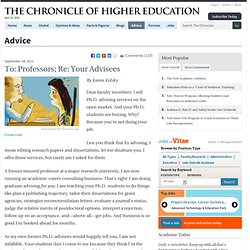

PageView. Mary Beard is a professor of classics at the University of Cambridge and classics editor at The Times Literary Supplement.

To: Professors; Re: Your Advisees - Advice. By Karen Kelsky Dear faculty members: I sell Ph.D. advising services on the open market.

With Limited Opportunities to Move, Many Senior Professors Feel Stuck - Faculty. September 11, 2011. On Hiring. People are talking about a recent article in The Economist on why obtaining a Ph.D. is supposedly “a waste of time.”

The author—who confesses that she “slogged through a largely pointless Ph.D. in theoretical ecology” more than a decade ago—makes the usual argument that universities are overproducing Ph.D.’s (though some would counter that the problem isn’t too many Ph.D.’s but rather too few tenure-track jobs) and chastises universities for using doctoral students as “cheap, highly motivated and disposable labour.”
She also points out that the interests of doctoral students, for many of whom the pursuit of a Ph.D. is a labor of love, conflict with those of their professors: “Postgraduate students bring in grants and beef up their supervisors’ publication records. Academics pick bright undergraduate students and groom them as potential graduate students. It isn’t in their interests to turn the smart kids away,” the author writes. How Will Colleges Innovate as the Market Is Disrupted? - The Editor's Notebook.
On Hiring. One of my favorite academic bloggers is Dean Dad, author of the very wise “Confessions of a Community College Dean.”

5 Years Later, the Growing Divide Worsens in Higher Education - The Editor's Notebook. PageView. Chris Impey is a professor of astronomy at the University of Arizona.

On Hiring. In my first post, I alluded to my own snobbishness about applying for jobs at community colleges when I was first on the job market.

And I also wrote about the intrinsic rewards of working at those colleges. But now, let’s get practical. Whether you are a graduate student or a midcareer professional — or both, like me — there are good reasons to consider employment at a two-year college. First, and most obviously, the United States has more such colleges than any other type of postsecondary institution.
More institutions with more students mean more job opportunities. Second, if you’re looking for a faculty position where you can focus on teaching, community colleges are ideal. Third is the issue of salary and benefits. Return to Top. Percolator. If you want to get a job at the very best law firm, investment bank, or consultancy, here’s what you do: 1.

Go to Harvard, Yale, Princeton, or (maybe) Stanford. Conducting the International Job Search - Manage Your Career. By Katrina Gulliver With the faculty job market as tight as it is in the United States, more academics are looking for options beyond their own country.

On Hiring. In Part 1 of this post, I focused on two key things that academic job seekers should do during the summer to improve their chances of finding a position: Keep up with the job listings, and network.

Here are four more off-season activities that every prospective candidate should consider: Plan your attack. Summer is the perfect time to re-evaluate your job-search strategy and decide what has worked and what you might want to change during the next round of applications and interviews. ProfHacker. Earlier this week, Miriam Posner, Stewart Varner, and Brian Croxall wrote “Creating Your Web Presence: A Primer for Academics.”

They had some terrific recommendations about how to establish an online presence and how to keep that presence active and positive. PageView. The A to Z of Dual-Career Couples - Manage Your Career. By Female Science Professor Much has been written in academe on the topic of dual-career couples, and it remains a major issue for many institutions and people, particularly for women in science, engineering, and math. My point of view on the subject is that of a full professor in the physical sciences at a large research university. My Daily Read: Sonja Lyubomirsky - PageView. Faculty Immobility in the New Economy - The Chronicle Review.
By Leonard Cassuto When Henry Louis (Skip) Gates Jr. left Duke University for Harvard University's African-American-studies department in 1991, it was his fourth work address in seven years. The Last of the Tenure Track - The Chronicle Review. By Daniel J. Ennis This year's season of assistant-professor job offers has come and gone. The search committee has entered that awkward clinch with Dr. Search. As Science Is Politicized, U.S. Prestige Wanes To the Editor: It’s both an embarrassment and a sad reflection on the state of scientific literacy in the United States that, unlike citizens of virtually all other Western countries, more than ... Most Colleges Chase Prestige on a Treadmill, Researchers Find - Archives. Colleges Should Cultivate Leaders Within Their Own Ranks - Commentary. By Cristina González Among the greatest strengths of the American higher-education system are its openness to outsiders and its relative lack of nepotism and cronyism.
American colleges hire faculty members and administrators from other institutions often and to good effect. But too much of a good thing can be bad: In recent times, many colleges have relied excessively on hiring external candidates to lead their institutions rather than adequately grooming internal candidates for leadership positions. American colleges lack stable leadership. Not only are most presidents hired from outside, but they stay on the job for increasingly brief periods, and the chief academic officers serving under them have even shorter tenures, as recent studies by the American Council on Education have revealed.